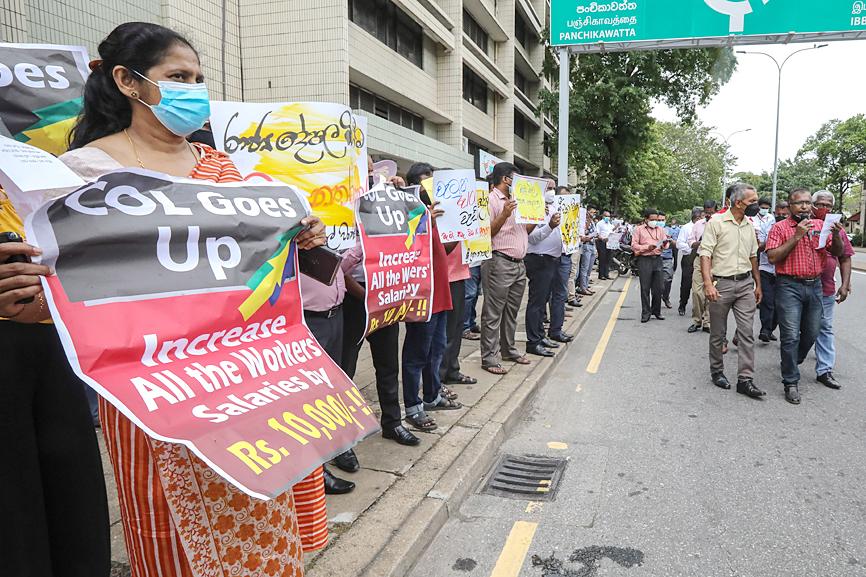The Sri Lankan government yesterday threatened to freeze the bank accounts of Sri Lankans working overseas who send money back to the country using informal money changers, as depleted foreign exchange reserves drive a thriving black market for US dollars.
The COVID-19 pandemic has wreaked havoc on the island’s economy, and the government has banned imports of food, vehicles and other items in an effort to shore up its stockpile of foreign currency.
These restrictions have led to severe shortages of food, cooking gas and cement, and Sri Lanka was forced to shut its only oil refinery last month, as it ran out of US dollars to import crude.

Photo: EPA-EFE
The official exchange rate of 202 rupees to the US dollar, offered by commercial banks that have run out of foreign currency, is well below the 240 rupees to 245 rupees offered by informal money changers now in the Sri Lankan central bank’s crosshairs.
Central Bank of Sri Lanka governor Ajith Nivard Cabraal said that migrant workers and others would face consequences if they sent their earnings home outside of official channels.
“Bank accounts of those who distribute and receive #money through #unlawful money transmission methods will be frozen with immediate effect,” Cabraal wrote on Twitter.
He added that the central bank “urges all #migrant Sri Lankans to use only #legal channels to #repatriate their earnings.”
The bank has also offered to pay a 10 rupee incentive to overseas workers who send money back through official channels, up from 2 rupees before.
Sri Lanka is struggling to service its foreign debt, and foreign exchange reserves had fallen to US$2.26 billion at the end of October, about one-third of the levels when a new administration took office two years ago.
Ratings agency Moody’s Investors Service in October downgraded Sri Lanka’s foreign debt rating, and the government last month unveiled a drastic austerity budget in an attempt to rein in its runaway deficit.
Central bank officials have said that the country is facing its worst foreign exchange crisis since the advent of a free economy and have demanded all exporters turn over their foreign exchange earnings to the government within six months.
Sri Lanka recorded its worst ever economic performance last year with a 3.6 percent contraction, fueled largely by the fallout from the pandemic on tourism.

CHIP RACE: Three years of overbroad export controls drove foreign competitors to pursue their own AI chips, and ‘cost US taxpayers billions of dollars,’ Nvidia said China has figured out the US strategy for allowing it to buy Nvidia Corp’s H200s and is rejecting the artificial intelligence (AI) chip in favor of domestically developed semiconductors, White House AI adviser David Sacks said, citing news reports. US President Donald Trump on Monday said that he would allow shipments of Nvidia’s H200 chips to China, part of an administration effort backed by Sacks to challenge Chinese tech champions such as Huawei Technologies Co (華為) by bringing US competition to their home market. On Friday, Sacks signaled that he was uncertain about whether that approach would work. “They’re rejecting our chips,” Sacks

Taiwan’s exports soared 56 percent year-on-year to an all-time high of US$64.05 billion last month, propelled by surging global demand for artificial intelligence (AI), high-performance computing and cloud service infrastructure, the Ministry of Finance said yesterday. Department of Statistics Director-General Beatrice Tsai (蔡美娜) called the figure an unexpected upside surprise, citing a wave of technology orders from overseas customers alongside the usual year-end shopping season for technology products. Growth is likely to remain strong this month, she said, projecting a 40 percent to 45 percent expansion on an annual basis. The outperformance could prompt the Directorate-General of Budget, Accounting and

NATIONAL SECURITY: Intel’s testing of ACM tools despite US government control ‘highlights egregious gaps in US technology protection policies,’ a former official said Chipmaker Intel Corp has tested chipmaking tools this year from a toolmaker with deep roots in China and two overseas units that were targeted by US sanctions, according to two sources with direct knowledge of the matter. Intel, which fended off calls for its CEO’s resignation from US President Donald Trump in August over his alleged ties to China, got the tools from ACM Research Inc, a Fremont, California-based producer of chipmaking equipment. Two of ACM’s units, based in Shanghai and South Korea, were among a number of firms barred last year from receiving US technology over claims they have

BARRIERS: Gudeng’s chairman said it was unlikely that the US could replicate Taiwan’s science parks in Arizona, given its strict immigration policies and cultural differences Gudeng Precision Industrial Co (家登), which supplies wafer pods to the world’s major semiconductor firms, yesterday said it is in no rush to set up production in the US due to high costs. The company supplies its customers through a warehouse in Arizona jointly operated by TSS Holdings Ltd (德鑫控股), a joint holding of Gudeng and 17 Taiwanese firms in the semiconductor supply chain, including specialty plastic compounds producer Nytex Composites Co (耐特) and automated material handling system supplier Symtek Automation Asia Co (迅得). While the company has long been exploring the feasibility of setting up production in the US to address